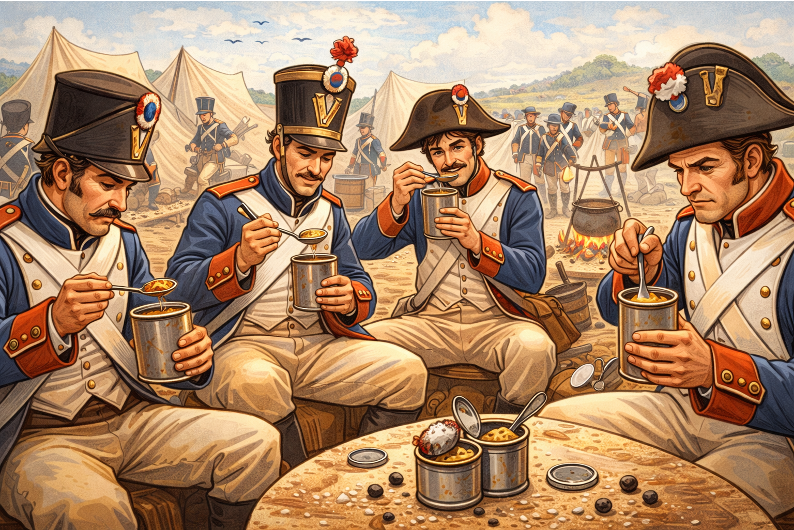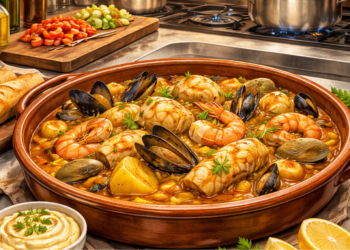The Napoleonic Wars and Canned Food Invention: A Battle Beyond the Battlefield
The Napoleonic Wars and canned food invention might not seem immediately linked, but in fact, one dramatically influenced the other. As Napoleon Bonaparte waged war across Europe in the early 19th century, he also launched a different kind of campaign — one to feed his massive army.
This wartime need sparked a food preservation breakthrough that changed the world. The history of food preservation during the Napoleonic era begins not in a kitchen, but in military strategy. Napoleon famously said, “An army marches on its stomach,” and he knew that victory depended as much on full bellies as on strong weapons.
How the Napoleonic Wars Led to the Invention of Canned Food
At the time, French soldiers were often hungry, sick, and undernourished due to poor-quality rations. Salting and drying were the main preservation methods, but they weren’t enough. To solve this growing crisis, the French government offered a 12,000-franc reward in 1795 to anyone who could find a better way to preserve food for troops.
This is where the Napoleonic Wars and canned food invention really collide.
A Parisian confectioner named Nicolas Appert took up the challenge. After years of trial and error, he discovered that food cooked inside sealed glass bottles — and later tinned metal cans — could be preserved safely for months without spoiling. In 1809, Appert won the prize, and the world gained a new tool for survival: canned food.
The Science Behind the History of Food Preservation
Appert didn’t understand the science at the time, but we now know that his method worked because it killed bacteria and created a vacuum seal. This revolutionized the history of food preservation during the Napoleonic era.
Though glass jars were Appert’s original containers, they were heavy and breakable. Soon after, British inventor Peter Durand improved the concept by patenting the use of tin-plated steel cans in 1810, further refining what Appert had begun.
The impact of this discovery extended far beyond the Napoleonic military. It laid the groundwork for modern food storage, global trade, and emergency food supplies.
Canned Food and the Logistics of Napoleonic Warfare
The Napoleonic Wars and canned food invention reveal how innovation often comes from urgent necessity. As Napoleon’s armies marched across vast territories — from Egypt to Russia — they needed reliable, portable food sources that didn’t spoil.
Canned food offered a solution. Though early versions were bulky and sometimes hard to open (soldiers would use bayonets or rocks!), they still extended the shelf life of meals dramatically.
While canned food wasn’t yet widely adopted by Napoleon’s forces during his lifetime, his war sparked the innovation. The true fruits of Appert’s invention would be seen in later conflicts — including the Crimean War, the U.S. Civil War, and both World Wars.
From the Battlefield to the Pantry: Long-Term Impact of the Napoleonic Canning Revolution
The history of food preservation during the Napoleonic era didn’t just change the way armies ate — it changed how civilians lived. By the mid-19th century, canned food became more accessible to the public. Factories began producing canned vegetables, soups, meats, and even milk.
This changed everything. It allowed for urbanization, global shipping of food, long-distance travel, and emergency rations. It was one of the few military innovations that made daily civilian life more stable — and often tastier.
Today, when you open a can of soup or tuna, you’re using a technology born from the Napoleonic Wars and canned food invention — a perfect example of necessity driving progress.
Why the Napoleonic Wars and Canned Food Invention Still Matter
In a world where food is often taken for granted, it’s worth remembering that one of our most basic conveniences — the tin can — was born in an era of conflict. The Napoleonic Wars and canned food invention remind us that innovation often comes from urgent needs.
Whether feeding armies or stocking your pantry, the history of food preservation during the Napoleonic era gave us more than a way to eat — it gave us a way to survive, grow, and connect across distances and time.







